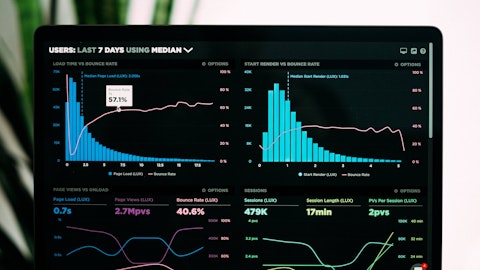2. Genworth Financial, Inc. (NYSE:GNW)
Number of Hedge Fund Holders: 21
Market Cap as of May 25: $2 billion
Genworth Financial, Inc. (NYSE:GNW) provides insurance products. The company posted earnings for the first quarter of 2022 on May 3, reporting earnings per share of $0.25, beating analyst expectations by $0.01. The revenue over the period was $1.89 billion. The firm also announced a $350 million share repurchase program a day prior to releasing the earnings. The firm said it expected to fund the repurchase through holding company capital and future cash flow generation, as well as dividends from Enact ownership.
Genworth Financial, Inc. (NYSE:GNW) offers products through in-house sales representatives and digital marketing programs. Some of the products offered include variable annuity, variable life insurance, and corporate-owned life insurance.
Among the hedge funds being tracked by Insider Monkey, North Carolina-based investment firm Shah Capital Management is a leading shareholder in Genworth Financial, Inc. (NYSE:GNW), with 11.5 million shares worth more than $43 million.
At the end of the first quarter of 2022, 21 hedge funds in the database of Insider Monkey held stakes worth $129 million in Genworth Financial, Inc. (NYSE:GNW), compared to 19 in the preceding quarter worth $128 million.
In its Q4 2021 investor letter, Gator Capital Management, an asset management firm, highlighted a few stocks and Genworth Financial, Inc. (NYSE:GNW) was one of them. Here is what the fund said:
“We own positions in both Enact Holdings and its parent company, Genworth Financial, Inc. (NYSE:GNW). Enact is one of six mortgage insurance companies. Mortgage insurance is purchased by borrowers to protect lenders if the borrower defaults on their mortgage. The government mortgage agencies (“GSEs”) require mortgage insurance when the borrower has a down payment of less than 20% of the home’s purchase price. Usually, first-time homeowners are the largest users of mortgage insurance since they often have the most difficult time accumulating enough savings for a 20% down payment. We believe the demand for mortgage insurance will be strong, but the mortgage insurance companies’ stocks are priced as though future earnings will not grow.
Here is our investment thesis on Genworth Financial, Inc. (NYSE:GNW):
Genworth Financial
We also own shares of Enact’s parent company Genworth Financial. We think Genworth is more attractive than Enact. Here is our investment thesis on Genworth:
- Leveraged return on Enact – Genworth’s main asset is the 132 million shares of Enact it still holds. Genworth also has about $1 billion of net debt at its holding company, so it is a leveraged version of Enact. If Enact stock increases in value, Genworth should increase a greater percentage due to the leverage at Genworth’s holding company.
- Two other assets held – Genworth has two other assets that we believe are not reflected in Genworth’s stock price. Currently, Genworth trades for approximately the value of its stake in Enact less its net debt. The two other assets Genworth owns are:
- Tax-sharing arrangement – Genworth Financial, Inc. (NYSE:GNW) has a tax-sharing arrangement with its subsidiaries. Since Genworth has past losses, it does not pay federal income taxes. Regulators allow Genworth’s subsidiaries to send tax payments to the holding company for liabilities created by the subsidiaries’ current income. However, the holding company can retain these cash tax payments because it has the tax shield from past losses. This tax-sharing arrangement allows Genworth to get cash out of the subsidiaries without asking regulators to allow dividend payments. In 2021, Genworth received $375 million in tax-sharing payments from its subsidiaries. We conservatively estimate Genworth could receive $200 million per year for the next five years. This amount would equal $2 per share, which is significant considering Genworth’s stock is only priced at $4.
- Life insurance subsidiary – Genworth also owns a life insurance subsidiary. The life insurance subsidiary is a large company on its own, but we assign zero value to this subsidiary because of potential losses in its long-term care insurance business. However, we observe that Genworth’s management team has done a very good job raising rates on its long-term care policies to counteract increasing policy costs. There is some possibility that 10 years from now, management’s actions could salvage some value from this subsidiary. If this subsidiary has any value, it could be so large that it would be meaningful to the stock price. For example, if the subsidiary is eventually worth half of its current $11 billion of book value (or $5.5 billion) then this subsidiary could be worth almost $11 per share. This potential scenario is far down the road, so currently we conservatively assign zero value to this asset in our valuation of Genworth…” (Click here to see the full text)





